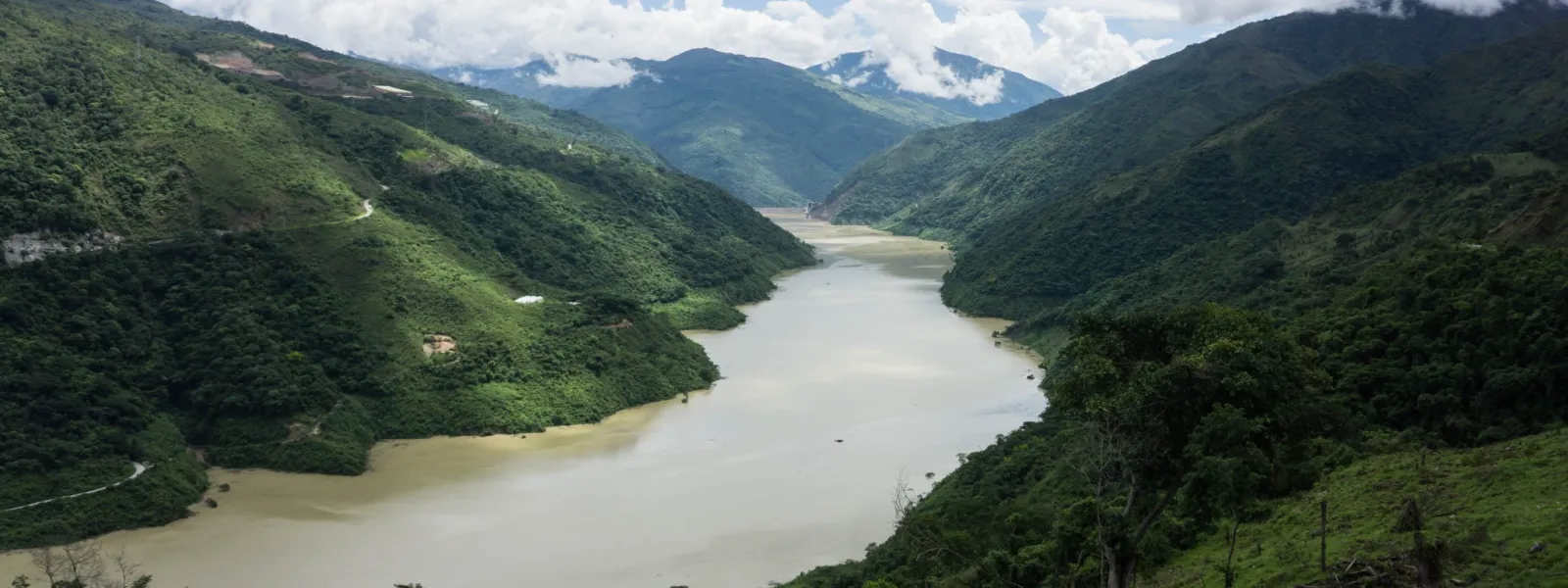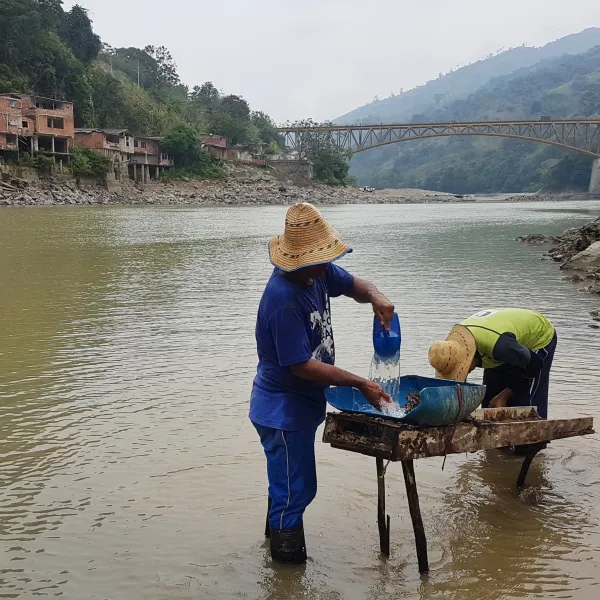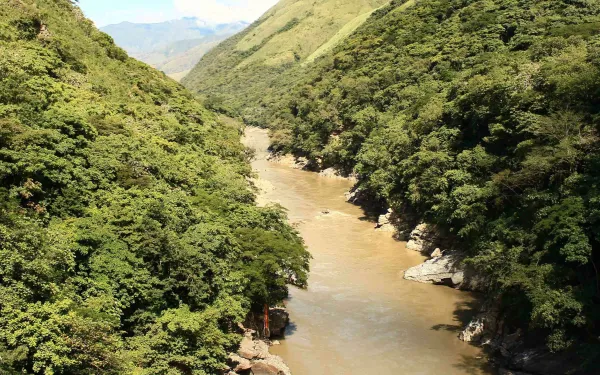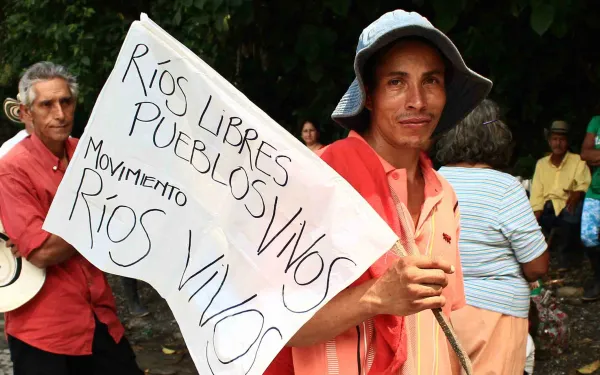
Project
Bram EbusSeeking justice for communities affected by the Hidroituango dam
The Cauca River is the second largest in Colombia. Many of the communities settled throughout its expansive watershed depend on the river for their livelihood, includingd fishing and agriculture.
Winding its way through the Andes mountains, the river courses through seven departments of Colombia, including Antioquia, now home to the Hidroituango Dam—a project that has created an unprecedented humanitarian crisis.
In May of 2018, an error in the dam’s construction caused floods, landslides, avalanches, and the evacuation of more than 25 thousand people. This tragedy exposed the inadequate evaluation of the project’s environmental impacts and the lack of environmental regulation in the dam’s authorization processes.
The project has led to systematic human rights violations, including the disproportionate use of force and an increase in violence against affected communities, who are represented by the Ríos Vivos (“Living Rivers”) Movement of Colombia.
Though construction is not complete, and electricity has not yet been generated, the dam has flooded more than 4,500 hectares of vegetation, releasing a significant amount of methane—a greenhouse gas that aggravates the global climate crisis.
And despite its inadequate implementation, IDB Invest, a private branch of the Inter-American Development Bank, invested millions of dollars into the hydroelectric project and facilitated the investment of billions more from other international banks.
Communities affected by Hidroituango have spent decades denouncing the serious problems caused by the dam, and will not waver in their struggle to defend their land and water.
Partners:

Related projects
Latest News

Communities affected by Hidroituango dam in Colombia file complaint at IDB
In the midst of the humanitarian crisis caused by the Hidroituango dam project in the Cauca river basin, local communities request that the Inter-American Development Bank (IDB)’s accountability mechanism investigate whether the financial entity violated its environmental and social standards when investing in the project. Washington, D.C. Communities affected by the construction of the Hidroituango dam in Antioquia, Colombia, filed a complaint with the Independent Consultation and Investigation Mechanism (MICI) of the Inter-American Development Bank (IDB) at its Washington, DC headquarters today. The complaint requests that this accountability office investigate whether the IDB, through both its public and private lending arms, violated its own social and environmental standards when it invested in the project. Through the complaint, the affected communities, represented by Movimiento Ríos Vivos Antioquia, highlight that the bank did not follow its policies that investment projects must be sustainable, participatory and respectful of national legislation in the case of HidroItuango. There was no adequate environmental impact assessment, communities did not have access to participation or information, and the project occurs in a context of human rights violations and disproportionate use of force. It has also endangered the lives of thousands of people, who have had to be evacuated ad hoc due to the dam crisis. This contradicts the social and environmental standards required of IDB investments. The hydroelectric plant will be the largest in Colombia, with a 49 mile (79 km) reservoir that will flood a surface of 11,120 acres (4,500 hectares). The IDB Group has financed the project through various types of investment. In 2012, it approved a $2 million in technical cooperation for the Colombian State and in 2016, $550 million in direct investments to the company in charge of the project, Empresas Públicas de Medellín (EPM). In addition, the IDB manages a $1 billion loan package for the project, with funds from multiple institutional investors, including banks in Europe (KfW IPEX (Germany), BNP Paribas (France), BBVA y Banco Santander (Spain)), Asia (ICBC (China), Sumitomo Mitsui (Japan)), and Canada (CDPQ). The MICI responds to complaints from individuals and communities affected by IDB-financed development projects. The communities settled in the Cauca river basin and its tributaries that are affected by Hidroituango, are accompanied in the complaint process by the Center for International Environmental Law (CIEL), Interamerican Association for Environmental Defense (AIDA) and International Accountability Project (IAP). The claim comes amid a humanitarian crisis in the dam construction area and a wave of increasing violence against people who are defending their territory and water and oppose the project. What began on April 28 with the obstruction of one of the dam's tunnels has resulted in landslides, floods, and thousands of people displaced from their homes. All this has exposed the inadequate evaluation of project impacts and the poor environmental regulation under which the project was authorized on every front. The state of emergency in the area is still in effect, and neither the Colombian government or the company has ruled out the risk of the dam collapsing. The members of Movimiento Ríos Vivos have suffered multiple threats, intimidations, and rights violations. Between May 2 and 8, two of its members were killed. In addition, the region where the dam is located has been affected by historical violence and armed conflict. press contacts Isabel Zuleta, Movimiento Ríos Vivos Antioquia, +57 3217347264, [email protected] Carla García, Center for International Environmental Law, [email protected] Astrid Puentes, Interamerican Association for Environmental Defense, [email protected] Carlos Lozano, Interamerican Association for Environmental Defense, [email protected] Alexandre Sampaio, International Accountability Project, [email protected]
Read more
Organizations call for support for communities affected by Colombia’s Hidroituango dam
Communities affected by the Hidroituango dam have denounced the murder of two of their members over the past few days. In addition, a recent obstruction in one of the dam’s tunnels means the dam is at risk of overflowing, which could cause an avalanche of mud and debris. Allies are calling on authorities to investigate the harms to local communities and provide adequate support for those affected. Two members of Movimiento Ríos Vivos Antioquia, the coalition of communities affected by Colombia’s Hidroituango Dam, have been murdered in the last several days. Hugo Albeiro George Pérez and Luis Alberto Torres Montoya were murdered on May 2 and 8, respectively, according to statements from Ríos Vivos. Members of the movement have also suffered threats, intimidation, and human rights violations due to their defense of their land and the Cauca River. At the same time, residents of towns downstream from the dam are living in fear and uncertainty this week, faced with a potential environmental catastrophe. The imminent danger is caused by an obstruction in one of the dam’s diversion tunnels that, by interrupting the flow of the Cauca River, could cause the dam to overflow with such force that it would release not just water but an avalanche of mud and debris. The Interamerican Association for Environmental Defense (AIDA), the Center for International Environmental Law (CIEL), and the International Accountability Project (IAP) express our support for Movimiento Ríos Vivos of Antioquia and the communities affected by the Hidroituango Dam in Colombia. We demand that Colombia’s environmental authorities find and punish those responsible for the murders, as well as investigate the ongoing damages caused by the dam’s construction. We also call on the national government to promptly and adequately provide support for affected families. Hidroituango, expected to become Colombia’s largest dam, will affect 12 municipalities, changing the lives of thousand of families that depend directly on the river. The project has received funding from IDB Invest, the private-sector branch of the Inter-American Development Bank. Press contact: Víctor Quintanilla, AIDA, +521 5570522107, [email protected]
Read more
Civil society organizations denounce assassination of member of Movimiento Ríos Vivos in Colombia
We stand in solidarity with the Movimiento, and we request that the Colombian State investigate this act and punish those responsible. Furthermore, we ask that Colombia adopt urgent and effective measures to stop ongoing violence against environmental defenders. The undersigned national and international organizations categorically condemn the assassination in Colombia of Mr. Hugo Albeiro George Pérez, member of Movimiento Ríos Vivos. Movimiento Ríos Vivos denounced the murder of Mr. George, who is a member of the Asociación de Víctimas y Afectados por Megaproyectos (ASVAM) El Aro—part of Movimiento Ríos Vivos Antioquia—and who, along with his family, was affected by the construction of the Hidroituango dam. The incident, in which his nephew Domar Egidio Zapata George was also killed, occurred on May 2, 2018, in Puerto Valdivia, Antioquia, in the context of regional community mobilizations against the social and environmental risks of the damming of the Cauca River. Hidroituango would be the largest dam in Colombia, with a height of 225 meters and a storage capacity of 20 million cubic meters of water. The project will affect 12 municipalities and impact thousands of families who depend on the river. The project is being financed by a loan package from IDB Invest, the private-sector arm of the Inter-American Development Bank. For defending the land and the Cauca River, Movimiento Ríos Vivos has been the target of threats, intimidation, and human rights violations. The owners of the Hidroituango project must respect human rights and act with due diligence in assessing the impacts of the dam’s construction. In response to the incident, we express our solidarity with Movimiento Ríos Vivos and with the family of Hugo Albeiro George Pérez. We request that the Office of the Attorney General of Colombia investigate this act in an expedited manner and that the appropriate court penalize those responsible. Likewise, and in the context of worsening violence against environmental defenders in the region, we demand that the government guarantee a safe setting for the work of Movimiento Ríos Vivos and to take all necessary precautions to stop the threats, intimidation, and murders against those who defend the environment and their territory. Finally, we request that environmental authorities investigate the impacts communities suffer due to the damming of the Cauca River and that the government provide assistance to the families affected by the project. Accion Ecologica, RedLar Ecuador. Afro-Colombian Solidarity Network. Alianza Internacional de Habitantes. Alianza para la Conservación y el Desarrollo, Panamá. Asamblea Veracruzana de Iniciativas y Defensa Ambiental, Lavida, México. Interamerican Association for Environmental Defense. Bank Information Center. Bretton Woods Project, Londres. CEE Bankwatch Network, Hungría Center for International Environmental Law, Estados Unidos. Centro de Derechos Económicos y Sociales, Ecuador. Coordinadora de Afectados por Grandes Embalses y Trasvases, Coagret. Colombia Grasssrooots Support, New Jersey, Estados Unidos. Colombia Human Rights Committee, Washington, DC, Estados Unidos. Colombia Land Rights Monitor. Consejo de los Pueblos Wuxtaj/CPO, Guatemala. Convergencia por los Derechos Humanos, Guatemala. Derecho, Ambiente y Recursos Naturales, Perú. Due Process of Law Foundation, Estados Unidos. Earthrights International. Ecosistemas Chile, Chile. Environmental Investigation Agency, Estados Unidos. Fundación Ambiente y Recursos Naturales, Argentina. Fundación Chile Sustentable, Chile. Fundar, Mexico. Front Line Defenders, Reino Unido. Global Witness, Reino Unido. IISCAL, Estados Unidos. International Accountability Project, Estados Unidos. International Labor Rights Forum. International Rivers. Latin America Working Group, Estados Unidos. Movement for Peace in Colombia, New York, Estados Unidos. Movimiento Mexicano de Afectados por las Presas y en Defensa de los Ríos, México. Movimiento Victoriano Lorenzo. Not1More. Oxfam. Plataforma Continental Somos una América. Pueblos Unidos de la Cuenca Antigua. Servicios para una Educación Alternativa, México. Taller de Comunicación Ambiental, Rosario. Washington Office on Latin America, Estados Unidos. Press contact: Víctor Quintanilla, AIDA, +521 5570522107, [email protected]
Read more